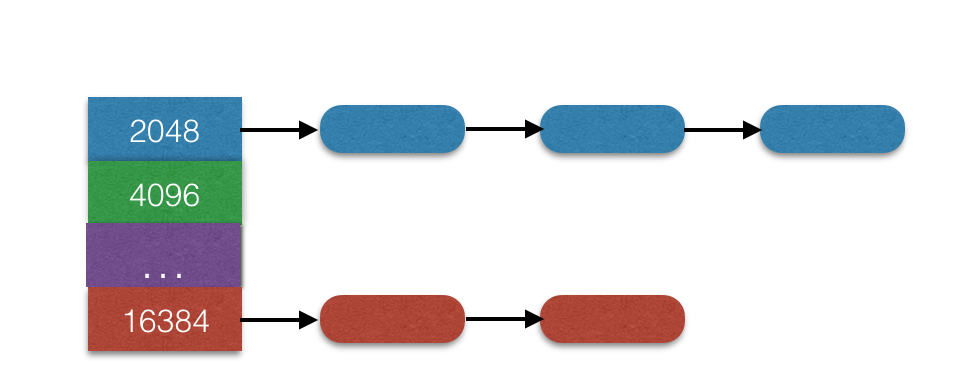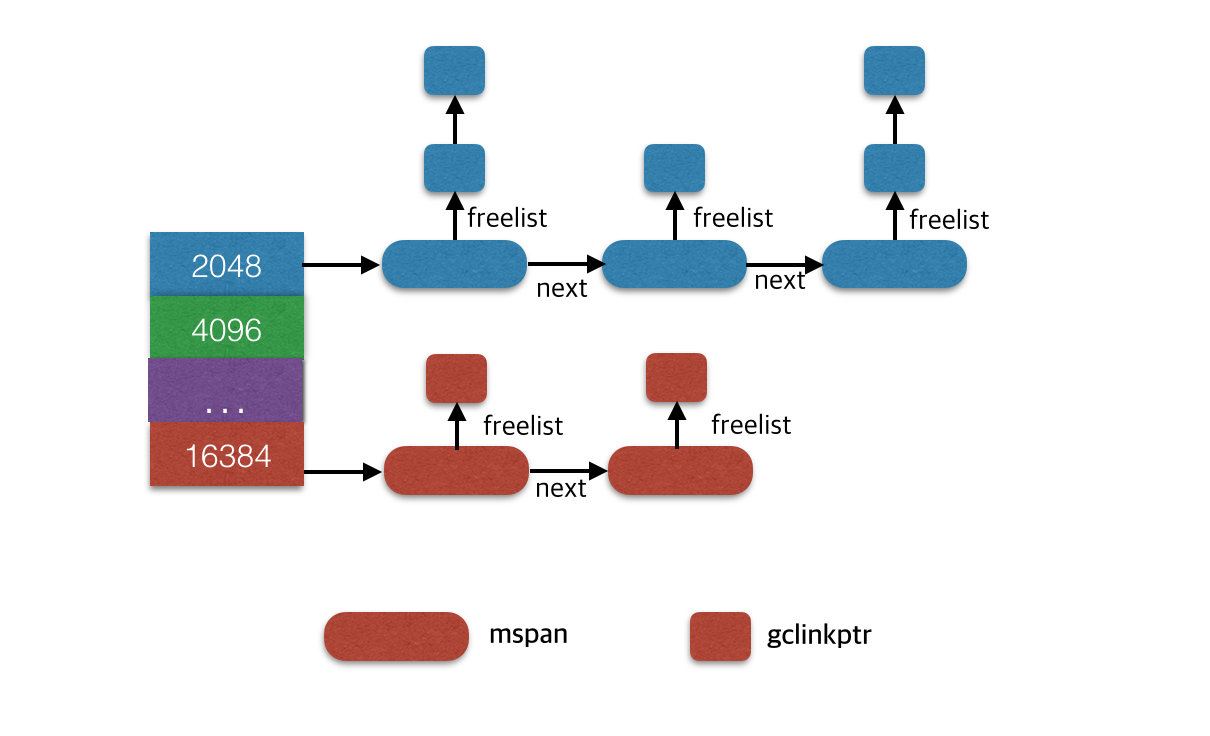Stack内存管理
介绍
要启动go协程,必须要为其准备栈空间,用来存储函数内变量、执行函数调用等。在go协程退出后,其占用的stack内存也会随之一同释放。
实际应用中协程的启动、退出可能会比较频繁,runtime必须要做点什么来保证启动、销毁协程的代价尽量小。而申请、释放stack空间所需内存则是一个比较大的开销,因此,go runtime采用了stack cache pool来缓存一定数量的stack memory。申请时从stack cache pool分配,释放时首先归还给stack cache pool。
主要思想
stack cache pool的主要思想是按照固定大小划分成多级:每级别其实是一个空闲stack队列:最小的stack size是_FixedStack=2KB。级别之间的大小按照2倍的关系递增。
同时为了效率考虑,除了全局的stack cache pool外,每个线程m还有自己的stack cache。这样,线程在分配的时候可以优先从自己的stack cache中查找,提高效率。
初始时,stack cache pool为空:当有stack分配需求时,首先向os申请一块较大的内存,将其按照该级别的stack大小切割后放在空闲stack列表上,然后再从该空闲stack列表上分配。主要结构如下:

数据结构
type mspan struct {
next *mspan // in a span linked list
prev *mspan // in a span linked list
start pageID // starting page number
npages uintptr // number of pages in span
freelist gclinkptr // list of free objects
// sweep generation:
// if sweepgen == h->sweepgen - 2, the span needs sweeping
// if sweepgen == h->sweepgen - 1, the span is currently being swept
// if sweepgen == h->sweepgen, the span is swept and ready to use
// h->sweepgen is incremented by 2 after every GC
sweepgen uint32
divMul uint32 // for divide by elemsize - divMagic.mul
ref uint16 // capacity - number of objects in freelist
sizeclass uint8 // size class
incache bool // being used by an mcache
state uint8 // mspaninuse etc
needzero uint8 // needs to be zeroed before allocation
divShift uint8 // for divide by elemsize - divMagic.shift
divShift2 uint8 // for divide by elemsize - divMagic.shift2
elemsize uintptr // computed from sizeclass or from npages
unusedsince int64 // first time spotted by gc in mspanfree state
npreleased uintptr // number of pages released to the os
limit uintptr // end of data in span
speciallock mutex // guards specials list
specials *special // linked list of special records sorted by offset.
baseMask uintptr // if non-0, elemsize is a power of 2, & this will get object allocation base
}
mspan是在go内存管理模块机器核心的一个数据结构,我们会在后面的章节中自习描述该结构的含义。
var stackpoolmu mutex
var stackpool [_NumStackOrders]mspan
主要流程
stackinit()
go程序在启动时首先会执行go runtime的初始化,此时会调用stackinit()来初始化stack cache pool。
func stackinit() {
if _StackCacheSize&_PageMask != 0 {
throw("cache size must be a multiple of page size")
}
for i := range stackpool {
mSpanList_Init(&stackpool[i])
}
mSpanList_Init(&stackFreeQueue)
}
初始化做的事情非常简单:初始化每个stack size级别的链表为空即可。
stackalloc(n uint32)
func stackalloc(n uint32) (stack, []stkbar) {
......
if stackCache != 0 && n < _FixedStack<<_NumStackOrders && n < _StackCacheSize {
order := uint8(0)
n2 := n
for n2 > _FixedStack {
order++
n2 >>= 1
}
var x gclinkptr
c := thisg.m.mcache
if c == nil || thisg.m.preemptoff != "" || thisg.m.helpgc != 0 {
// 线程本地stack cache为空
// 直接从全局stack cache pool分配
lock(&stackpoolmu)
x = stackpoolalloc(order)
unlock(&stackpoolmu)
} else {
// 直接从线程本地缓存分配
x = c.stackcache[order].list
if x.ptr() == nil {
// 如果线程本地分配完,则从全局stack cache pool分配一批给线程
// 再从线程的local stack cache分配
stackcacherefill(c, order)
x = c.stackcache[order].list
}
c.stackcache[order].list = x.ptr().next
c.stackcache[order].size -= uintptr(n)
}
v = (unsafe.Pointer)(x)
} else {
s := mHeap_AllocStack(&mheap_, round(uintptr(n), _PageSize)>>_PageShift)
if s == nil {
throw("out of memory")
}
v = (unsafe.Pointer)(s.start << _PageShift)
}
......
}
这里的分配算法思想是:
- 如果线程m的local stack cache为空,则直接从全局的stack cache pool中分配;
- 否则先从线程的local stack cache中分配,如果无法分配除,则需要先给线程分配出一批stack,赋给该线程,再从线程local stack cache中再分配。
stackpoolalloc(order uint8)
// Allocates a stack from the free pool. Must be called with
// stackpoolmu held.
func stackpoolalloc(order uint8) gclinkptr {
list := &stackpool[order]
s := list.next
// 如果该队列为空了,需要向heap管理模块再申请
// 分配的结果为一个mspan结构
if s == list {
s = mHeap_AllocStack(&mheap_, _StackCacheSize>>_PageShift)
if s == nil {
throw("out of memory")
}
if s.ref != 0 {
throw("bad ref")
}
if s.freelist.ptr() != nil {
throw("bad freelist")
}
// 将申请得到的空间mspan按照该级别的stack大小拆分成多项(gclinkptr)并添加到mspan的空闲链表(mspan.freelist)中
for i := uintptr(0); i < _StackCacheSize; i += _FixedStack << order {
x := gclinkptr(uintptr(s.start)<<_PageShift + i)
x.ptr().next = s.freelist
s.freelist = x
}
// 将分配的mspan插入到pool的空闲span链表
mSpanList_Insert(list, s)
}
x := s.freelist
if x.ptr() == nil {
throw("span has no free stacks")
}
s.freelist = x.ptr().next
s.ref++
// 如果分配导致s(mspan)的空闲链表变空
// 将其从pool的空闲span链表中摘除
if s.freelist.ptr() == nil {
// all stacks in s are allocated.
mSpanList_Remove(s)
}
return x
}
分配后的系统stack cache pool结构如下:

stackfree()
func stackfree(stk stack, n uintptr) {
......
if stackCache != 0 && n < _FixedStack<<_NumStackOrders && n < _StackCacheSize {
order := uint8(0)
n2 := n
for n2 > _FixedStack {
order++
n2 >>= 1
}
x := gclinkptr(v)
c := gp.m.mcache
// 如果禁用了m local stack cache,直接归还至全局stack cache pool
if c == nil || gp.m.preemptoff != "" || gp.m.helpgc != 0 {
lock(&stackpoolmu)
stackpoolfree(x, order)
unlock(&stackpoolmu)
} else {
// 如果m的local stack cache超标
// 先归还一部分(一半)至全局stack cache pool
if c.stackcache[order].size >= _StackCacheSize {
stackcacherelease(c, order)
}
x.ptr().next = c.stackcache[order].list
c.stackcache[order].list = x
c.stackcache[order].size += n
}
// 直接归还,暂时不考虑
} else {
s := mHeap_Lookup(&mheap_, v)
if s.state != _MSpanStack {
println(hex(s.start<<_PageShift), v)
throw("bad span state")
}
if gcphase == _GCoff {
// Free the stack immediately if we're
// sweeping.
mHeap_FreeStack(&mheap_, s)
} else {
// Otherwise, add it to a list of stack spans
// to be freed at the end of GC.
//
// TODO(austin): Make it possible to re-use
// these spans as stacks, like we do for small
// stack spans. (See issue #11466.)
lock(&stackpoolmu)
mSpanList_Insert(&stackFreeQueue, s)
unlock(&stackpoolmu)
}
}
}
stackpoolfree()
// Adds stack x to the free pool. Must be called with stackpoolmu held.
func stackpoolfree(x gclinkptr, order uint8) {
// 查找该x所属的mspan
s := mHeap_Lookup(&mheap_, (unsafe.Pointer)(x))
if s.state != _MSpanStack {
throw("freeing stack not in a stack span")
}
// 如果s之前的freelist为空,已经从pool的空闲span链表中摘除
// 现在归还了,说明有空闲空间了,将其重新添加到pool的空闲span链表中
if s.freelist.ptr() == nil {
mSpanList_Insert(&stackpool[order], s)
}
x.ptr().next = s.freelist
s.freelist = x
s.ref--
// s.ref==0说明span的freelist所有栈空间全部被释放
// 此时就可以将该span的空间释放
if gcphase == _GCoff && s.ref == 0 {
// Span is completely free. Return it to the heap
// immediately if we're sweeping.
//
// If GC is active, we delay the free until the end of
// GC to avoid the following type of situation:
//
// 1) GC starts, scans a SudoG but does not yet mark the SudoG.elem pointer
// 2) The stack that pointer points to is copied
// 3) The old stack is freed
// 4) The containing span is marked free
// 5) GC attempts to mark the SudoG.elem pointer. The
// marking fails because the pointer looks like a
// pointer into a free span.
//
// By not freeing, we prevent step #4 until GC is done.
mSpanList_Remove(s)
s.freelist = 0
mHeap_FreeStack(&mheap_, s)
}
}